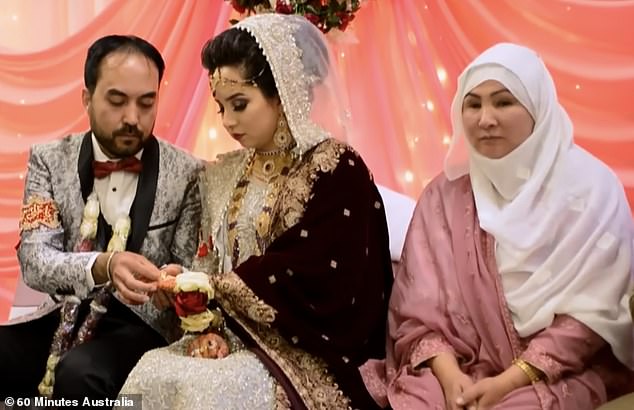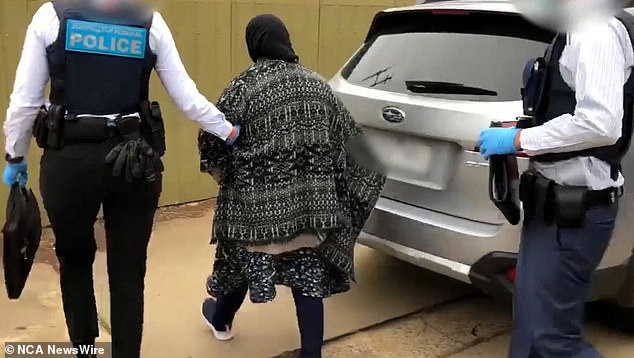Afghan mum who forced her daughter into an arranged marriage before her husband killed her is facing jail: ‘Not in Australia’
A court has ruled that a woman who forced her daughter into an arranged marriage that ended with the bride’s murder by her husband could face a prison sentence.
Sanika Muhammad Jan, 48, from Shepparton in Victoria, appeared in the Melbourne County Court on Tuesday.
In May, a jury found Jan guilty of forcing her daughter Ruqia Haidari, 21, to marry Perth resident Mohammad Ali Halimi in November 2019.
A criminal case for forced marriage is unprecedented in Australia due to relatively new federal laws prohibiting the practice and the underground nature of such arrangements.
On Tuesday, the court was told that Jan had been married in Afghanistan at the age of 13 under an arrangement. She had five children and never went to school.
Her husband was killed by the Taliban and the family fled, spending 13 years in a refugee camp in Pakistan before settling in Australia in 2013.
Defence lawyer Andrew Buckland said Jan acted in a deceptive manner by forcing her daughter to marry, and that she believed this was in her daughter’s best interests.
Ms Haidari had an arranged marriage at the age of 15, but it ended in divorce and the family was burdened with a cultural stigma surrounding the divorce, Buckland said.
Sakina Muhammad Jan forced her daughter into marriage with a male relative

Ruqia (center) was forced to marry 25-year-old Afghan refugee and Uber driver Mohammad Ali Halimi (left) by her mother Sakina Muhammad Jan (right), who paid him a dowry
“Mrs. Jan believed the marriage was the right thing to do because of her reputation and Mrs. Haidari’s reputation,” he said.
Mrs Haidari was murdered by her new husband in Perth in January 2020, approximately six weeks after the wedding.
Jan had not accepted criminal responsibility, the court was told.
“She has not admitted her responsibility, but there is something to indicate her remorse. She has said that all the time and again to me this morning. If she had known what Mr Halimi was like, she would not have let her marry him,” Buckland said.
Halimi was sentenced to life imprisonment with a minimum of 19 years by a Perth court.
Mrs Haidari and her murderous husband had known each other for a few months before the wedding, which Judge Fran Dalziel said was ‘incomprehensible’.

Jan spent 13 years in a refugee camp after fleeing the Taliban. Photo: Victoria Police
“Yes, but it’s a different culture,” said Mr Buckland.
“It’s incomprehensible, but it stems from a culture of arranged marriages.”
Jan doesn’t speak English and had an interpreter in court.
She could not accept her guilt for the marriage because otherwise she would also be accepting responsibility for her daughter’s death, Buckland said.
The family is Hazara, an ethnic minority in Afghanistan that has been victims of violence. A son and son-in-law of Jan appeared in court on Tuesday.
According to prosecutor Darren Renton, Ms Haidari trusted her mother immensely and was financially dependent on her.

Jan will hear her punishment on Monday
“The day after she met the man, Haidari expressed her concerns to people outside the family. She basically said I have no choice (to get married),” Mr Renton said.
“She had no choice.”
Forced marriages are difficult to investigate and prosecute, he said.
“The community needs to know that you can’t do this. You can’t operate like this in Australia,” Mr Renton said.
“What did happen (the murder) is almost exactly why Parliament says these marriages cannot take place.”
The case could relate to the controversial section 501 of Australia’s Migration Act, which allows a migrant’s visa to be revoked if he or she fails a character test.
The court was told that if Jan was sentenced to prison, he could be deported to Taliban-controlled Afghanistan.
“Her visa could be revoked,” Judge Dalziel said.
“But the fact that she is a woman, where she comes from and who is in charge, and the fact that she is a Hazara, means that if I sentence her to 12 months in prison, that (deportation) poses a significant risk to her.”
Judge Dalziel will deliver her verdict in court on Monday. The central question the court will answer is the length of detention.
Outside the courtroom, television reporters and cameras chased Jan through a busy intersection in Melbourne’s CBD, asking her if she felt “ashamed” of her actions, despite being repeatedly told she did not speak English.
